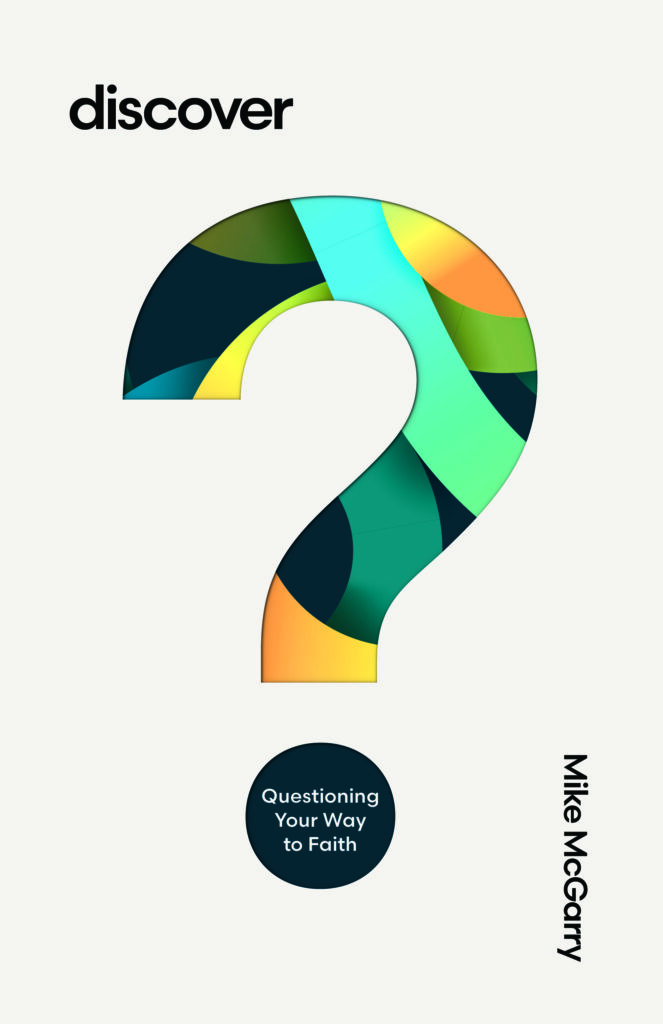At some point or another, every Christian will have questions about God, the Bible, and how the gospel applies to life today. This is especially true for teens who are trying to find their way and develop their own faith. It is perfectly normal, and there is no reason to be embarrassed by such questions.
In his nearly twenty years as a youth pastor, Mike McGarry has heard just about every question students ask. Their questions are important—and they may prove to be the very thing that actually leads them into deeper faith. In Discover: Questioning Your Way to Faith, McGarry explores the twenty most common questions teenagers ask. In doing so, he wants students to see their questions as an opportunity to dig deeper so they can grow in faith.
Q: How did the students from the youth group that you led motivate you to write Discover? Did all the questions you answer in the book come from directly from them?
Over the last twenty years, I’ve had conversations with teenagers about each of the questions in this book. Some of them are questions teenagers ask directly, while others are indirect. For example, students will ask about whether or not Christians, Jews, and Muslims worship the same God. This is a direct question about the difference in religions, but it’s also an indirect question about the Trinity.
Writing this book, Discover, came out of my previous book for youth workers, Lead Them to Jesus. In that book, I addressed a number of theological questions teenagers commonly ask, and then offered counsel to help these leaders engage those theological conversations with confidence. I received my author copies of Lead Them to Jesus while leading a service project for my youth group, so a bunch of students flipped through the book, and one of them said, “Hey, if this was written for teenagers instead of adults, I’d totally read it.” Then a few others said, “Yeah, me too!”
After that conversation, the publisher and I agreed to revisit those chapters and develop them for a teenage audience. I also added new content to addresss questions that weren’t covered in the first book.
Q: The questions you cover in the book aren’t “fluff.” Are you ever surprised at the level of depth and maturity of the questions that teens ask?
I used to be surprised, but I’m not anymore. I do think a lot of parents would be surprised by their teenagers’ theological curiosity. They wouldn’t call themselves theologians, but they have lots of questions about God and faith and spirituality—and those are theological questions.
This curiosity is especially true of church kids. They’ve grown up their entire lives hearing the same stories and truths from VBS through high school graduation. Of course, they can get bored with the Bible when we always keep the cookies on the lowest shelf. But when you dig into the meat of the text and challenge them to think deeply about doctrinal truths that you might expect to be over their heads, you may be surprised when they step up to the challenge.
Q: Do you really think teenagers care about theology enough to read this book? What are some of the theological questions you delve into?
Our teenagers are growing up in a hyper-tolerant culture, and that actually makes them really open to conversations about the questions in the book. While religious conversations among other generations might still be considered taboo, GenZ is spiritually curious.
Again, because “church kids” are often given the same basic message over the same basic Bible stories throughout their lives, digging deeper into theology is appealing to them. This is why they’re curious about the Trinity and the nature of the Holy Spirit and different views on much-debated issues like creation and Jesus’s return. Apologetics-related questions are always really valuable conversations with teenagers, too, such as examining the evidence that Jesus rose from the grave and discussing the reliability of the Bible.
Q: With so many teens and young adults leaving the church (or just not having a foundation of faith), how can parents, youth leaders, mentors, etc. provide welcoming environments for conversations to talk more about their questions and anchor them in strong doctrine?
If we want our youth to talk about their big questions with us but we shrug off their “smaller” questions, then we’re shooting ourselves in the foot. I think we need to take those small questions seriously and engage in the conversation without turning it into a lecture where we simply give “the right answer.”
It’s easy for parents to hear their kids’ questions or doubts and to fear the worst: They’re starting to doubt! What if they lose their faith? In an effort to help them continue following Christ, they jump into action with all the answers. But when that happens, we’re removing all the lessons our kids learn by discovering faith for themselves. We shouldn’t leave them all alone, but we also shouldn’t try to rescue them from asking hard questions. Instead, let’s lean into the questioning and walk that path with them, while helping them discover answers rather than serving up all the answers on a silver platter.
Q: You talk about how different generations have differing definitions of tolerance, which can cause frustration and conflict. What should both the younger and older generations know about each other in order to have more fruitful conversations?
I am passionate about helping older generations understand GenZ’s worldview because good communication isn’t about what’s said, but what’s heard. If we proclaim the good news of Christ without understanding GenZ, our message of hope and life might be heard as a word of condemnation or hatred. Of course, there’s a spiritual component here, and we need to pray for the Holy Spirit to soften hearts and open ears. But there’s also a very real sense in which understanding GenZ’s approach to tolerance can help us identify areas where the gospel will be heard and received as the good news it truly is.
For example, there’s been a lot of hand-wringing over cancel culture but there is much misunderstanding of what it is. From GenZ’s perspective, no one “gets cancelled”—they cancel themselves. You see, tolerance is the new golden rule, and safety is the new American dream. When someone says something that threatens another person’s safety (emotional or physical) then the community rallies around that person to protect them. That’s what cancel culture is; it’s an embodiment of protecting your peers from someone who is threatening to them. And this is why it’s really important for us to understand how to communicate important gospel truths in a way that the gospel is the only offense, not the way we say it.
Q: What are some of the topics you cover in the book that you wish would get more attention?
The first is the chapter, “What Is the Trinity?” Questions about the Trinity involve who God is, and I don’t think we talk nearly enough about this. After all, if you need to believe in the Trinity to be a Christian (which is a longstanding hallmark of the faith), then we need to talk about this truth with teenagers. Instead, it’s become a doctrine that’s so intimidating we rarely give it our attention, choosing instead to focus on felt-need topics that are more appealing to teenagers. Thankfully, there are some really good and accessible books coming out about the Trinity.
Another is “Why Is the Church Important?” This is a topic that many people don’t think would interest teenagers, especially since there’s this assumption that church is boring but youth group is supposed to be fun. And yet, if we want to make lifelong disciples then we need to help our students develop a deep and abiding love for the local church. Youth ministry is an expression of the church’s partnership with parents to evangelize and disciple the next generation. And yet, many youth ministries function independently from the church and don’t intentionally help students find a sense of belonging within the local church. I think this is a huge mistake and only sets students up to leave the church when they graduate.
Q: In what ways do the chapters on sex and LGBTQ+ issues go deeper than the typical discussions on these subjects?
I’m not sure that I necessarily go deeper than typical discussions, but I address them from a different perspective. I explain why homosexuality simply does not reflect what the Bible says sexuality represents—perfect intimacy between Christ and the church. That’s a biblical/theological foundation that isn’t mentioned often, and students are simply left with messages about “do this” or “don’t do that.” I tried to present a short and accessible biblical theology of sexuality to present a bigger picture of the biblical message.
Q: Mental health and suicide are extremely important topics you address in the book. What advice do you have for the parent or youth worker who doesn’t feel equipped to walk a teen through these chapters?
Recent statistics suggest nearly one-third of students regularly struggle with anxiety and depression, while two-thirds consider it a major concern among their peers. Everyone walks through sad or anxious seasons in life, but many are experiencing something deeper and more overwhelming: a sense of despair with no hope for improvement.
It’s important for parents and youth workers to educate themselves about anxiety and depression in order to help their struggling teenager navigate their trials. We should not be afraid of mental health diagnoses as if it’s a mark of shame or failure. Instead, let’s confess our struggle, bring it into the light, and walk in the grace of Christ. He is our strength and our Savior, so let’s channel our anxiety and depression in a way that propels us into fellowship with Christ (“Father, I’m struggling, would you strengthen and comfort me?”) rather than away from him (“Why would you do this to me?”).
Q: What are the three ways teens can read the book? Why are the discussion questions important, even if the teen is reading the book on his or her own?
Discover was written to be read either independently, with a parent/mentor, or in a small group setting. Teenagers can read this book on their own, though I strongly recommend middle schoolers to read the book along with a parent/mentor or in a small group since some of the topics may be confusing or difficult. If you read the book in a small group, I strongly recommend you literally read the chapter together and then discuss the questions, since they’re written to help ensure you understand the content and application of that chapter’s message.
Q: Tell us more about Youth Pastor Theologian.
Youth Pastor Theology (YPT) is a ministry that empowers youth workers to pursue theological depth. I started the ministry a little over two years ago and am currently transitioning to lead it as my full-time ministry moving forward. I’m excited to provide more resources and coaching to help youth workers build their ministry on a biblical and theological foundation. We currently publish a blog post and podcast each week during the school year and we’re working on developing some exciting new resources.
Discover: Questioning Your Way to Faith
In nearly twenty years as a youth pastor, Mike has heard just about every question students ask. Your questions are important—and they may prove to be the very thing that actually leads you into deeper faith. Discover covers a wide range of questions that teens like you ask about faith including: Why does God allow suffering? Why should we trust the Bible? Is church relevant? Does God care about my sexual identity? and more.






